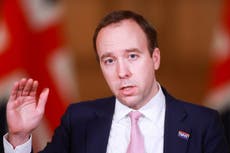Evidence that new variant is more deadly, Boris Johnson warns, but vaccines ‘remain effective’
Instead of killing ten in every 1,000 people in their 60s - 13 or 14 people ‘might be expected to die’
The new variant of Covid-19 spreading in the UK appears to be more deadly, Boris Johnson has warned.
There is evidence that it “may be associated with a higher degree of mortality” among those infected, he told a press conference.
It is believed that scientists have found 1.3-fold increased risk of death compared with the old variant of coronavirus.
“Instead of ten in every 1,000 people in their 60s with Covid passing away, 13 or 14 people “might be expected to die”, Patrick Vallance said.
I want to stress there is a lot of uncertainty,” the chief scientific adviser said,” but he added: “This is obviously a concern.”
The prime minister said the 38,562 Covid patients in hospital is 78 per cent higher than in the first peak in April.
But he sought to ease fears, saying: “All current evidence continues to show that both the vaccines we're currently using remain effective both against the old variant and this new variant.”
Sir Patrick said the new information would not change the death rate, but admitted: “The death rate is awful and it is going to stay high for a little while.”
Mr Johnson acknowledged the risk of “another big rebound” if the lockdown is lifted too soon, saying: “We have got to get those rates of infection down. It’s not just a question of rolling out the vaccine.”
But he hailed that the “immunisation programme continues at an unprecedented rate”, with a record 357,563 first doses administered in England yesterday.
“5.4 million people across the UK have now received their first dose of the vaccine and over the last 24 hours we can report a record 400,000 vaccinations,” the prime minister said.
“In England one in ten of all adults have received their first dose, including 71 per cent of over-80s and two thirds of elderly care home residents.
“First doses have been administered now to 151,000 people in Northern Ireland, 358,000 in Scotland and 212,000 in Wales.”
Sir Patrick was challenged on the controversial decision to delay giving people a second jab until 12 weeks after their first inoculation – after Sage minutes said there was a risk of triggering a “vaccine-resistant mutation”.
But he insisted: “The most risky thing in terms of new mutations is to have very high prevalence.
He added: “That is what is happening around the world – that is why we are seeing the same mutations popping up everywhere.”
The chief scientific adviser admitted there was “always some risk” with partial immunity”, but insisted: “I don’t think it is the biggest risk.”
Join our commenting forum
Join thought-provoking conversations, follow other Independent readers and see their replies
Comments




Bookmark popover
Removed from bookmarks